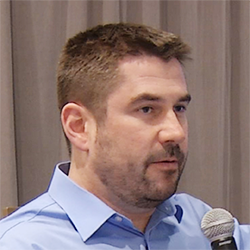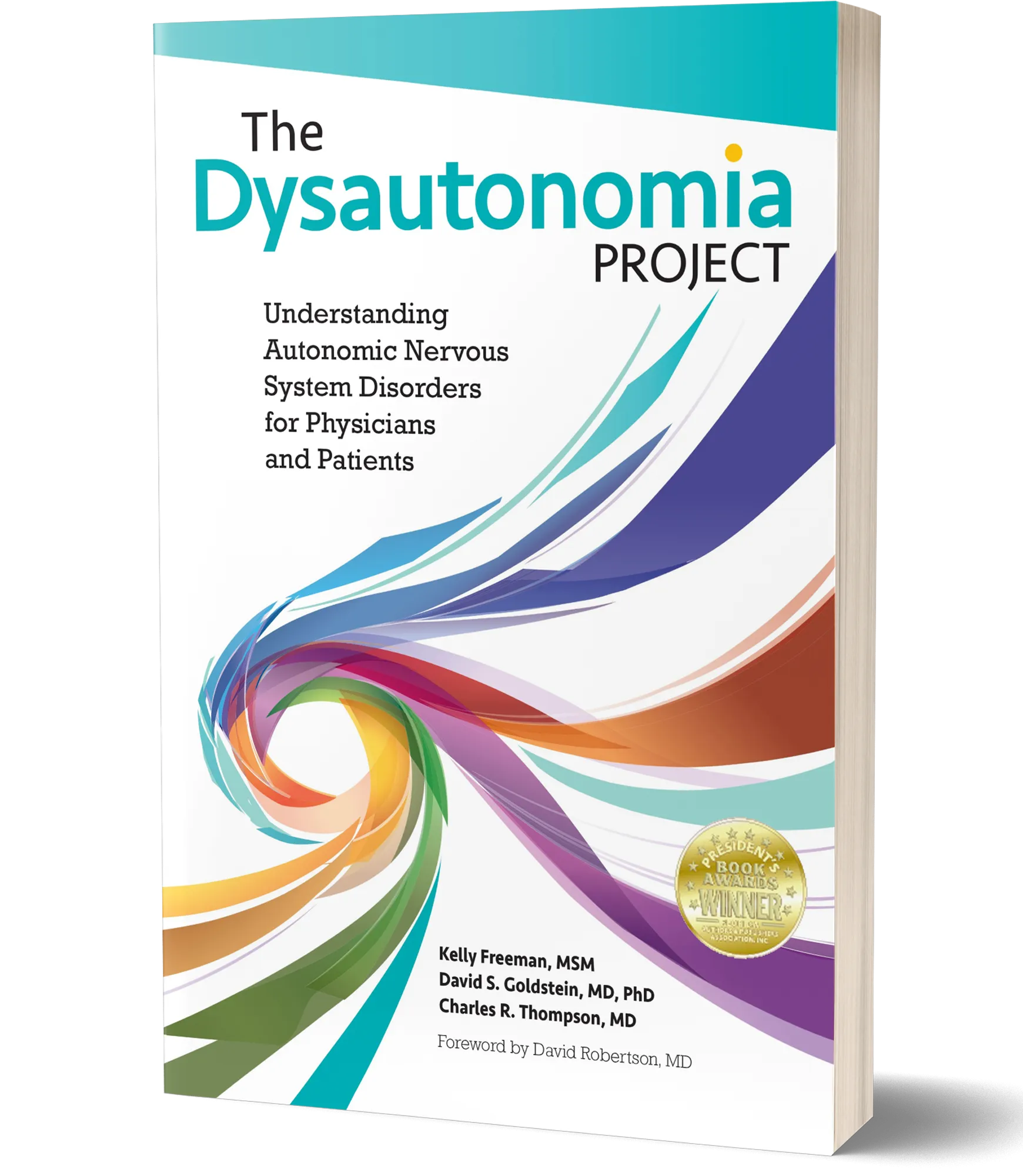Home » Dysautonomias » Dysautonomia & Drugs with Italo Biaggioni, MD
Dysautonomia & Drugs with Italo Biaggioni, MD
In this video Dr. Biaggioni discusses the role of drugs in autonomic medicine including how to manage medications in preparation for autonomic testing.
Mr. Al Ruechel: Hi everybody, I’m Al Ruechel thank you for joining us here on our website as we continue to explain things that are involved with dysautonomia. Joining me right now is Doctor Italo Biaggioni. Doctor thank you so much for stopping by.
Dr. Italo Biaggioni: Thank you for having me here.
Mr. Ruechel: Let’s talk a little bit about your background, kind of your credentials and then what you do now that has to do with dysautonomia.
Dr. Biaggioni: Well, I came to Vanderbilt thirty-six years ago to train in research after doing an internship and a three-year residency program in internal medicine. I wanted to try research and see if I would like it and honestly, I loved it. Because I kept staying at Vanderbilt, it’s a wonderful place to work and to do research. I train with David Robertson and I just kept staying and so my love for autonomic function and disease came from that early on. Understanding how the body regulates blood pressure and heart rate and many other functions and how that is handled so well with the autonomic nervous system and how things can go so bad when that regulation doesn’t work.
Mr. Ruechel: We think in medicine that, well some think in medicine that we’ve got all the answers but in reality, it is an art for one thing and we’re always learning new things. So, what are we learning new about the autonomic nervous system that we maybe didn’t know before?
Dr. Biaggioni: Well, we always learn new things. Most of the fundamentals have been known for a long time but we always coming up with new ways to treat patients. We sometimes find patients that have unique disorders and we learn so much from them and apply what might seem to be old news and make it so that we can use that that to treat patients in a different way. We are always trying to do that.
Mr. Ruechel: So, drug treatments, pharmacology, there are some people who say, nope stay away completely but then there are others that say these people deserve some kind of relief, some kind of especially from their symptoms, some of them feeling a lot of pain, some of them fainting. So, tell me a little more about the drug interactions with the autonomic nervous system.
Dr. Biaggioni: Right, so I’m actually trained as a clinical pharmacologist so we do drugs. But, we more often than not we try to stop drugs from patients. Some of our patients come from a long list of medications and the longer that list is the more likelihood of interactions and side effects and very often we take patients off medications and you would be surprised at how often they feel so much better. So, we use drugs in a very judicious way and try to do everything else first. But certainly, a lot of our patients when they come to us, they do need medications to help their symptoms.
Mr. Ruechel: Does the body have the ability to, when drugs that are foreign are introduced into the body to in quotes to put together a work around as they often say, I’m thinking about when people start talking about diet sodas and stuff where guess what the body has figured out ok it’s a diet it’s not sugar but guess what I’m going to manufacture something else that’s almost as bad.
Dr. Biaggioni: And some of that is due to the autonomic nervous system, so when we give a medication that does A the autonomic nervous system tries to counteract that and does B and so we need to always consider that and work together with your autonomic nervous system to get the results we want.
Mr. Ruechel: Talk to me about some of the drug names and what they specifically do and I know there are a lot of different variations but primarily which drugs do you use.
Dr. Biaggioni: Well, it depends on what you use them for. So we have a lot of patients with very very low blood pressure on standing, those are usually older patients that have neurodegenerative disorders of the autonomic nervous system with orthostatic hypotension and they need medications that increase blood pressure and those pressure regions midodrine, droxidopa, there are several, fortunately, now on the market or that we can borrow from other diseases that we can use to improve the patient’s blood pressure. We have other problems like postural tachycardia syndrome and those are usually young patients, more often women in their prime of their life, that are disabled because of all the symptoms they have on standing, with large increases in heart rate that are very symptomatic and we need to decrease their heart rate and we can do that with beta blockers with calcium channel blockers, certain medications that tone down the adrenaline in the system. So, it depends on the patient and the characteristic and the subtype of the patient.
Mr. Ruechel: Now if you were dealing with just one disorder it would certainly be a lot easier because then you could target that particular pharmaceutical or drug toward that problem. But then you have one system, two systems, three systems, four systems involved and there’s always the danger of as you said there is going to be side effects and then you don’t know how each individual reacts to every drug. We think we know they all react the same but they don’t.
Dr. Biaggioni: Oh absolutely not, every patient is different and so we have from our research and the textbooks we assume we know what a drug will do to a patient but I like to say every patient is different and patients don’t read the textbooks and they may react individually to whatever medication we give them. So, we need to personalize the treatment.
Mr. Ruechel: So, which drugs specifically produce symptoms or signs of autonomic failure?
Dr. Biaggioni: There is a lot of what I call ketinnsympatholitic, sympatholitics meaning that will impair the ability or impair the sympathetic nervous system to regulate blood pressure and some of the muscle relaxants people use, like Tizanidine for example, can lower blood pressure quite a bit and in a lot of patients just removing them can produce a significant improvement. It doesn’t necessarily cure them because chances are that they had some background impairment already and that medication just makes it so much worse. The autonomic nervous system is so important that the body can tolerate a lot of injury, a lot of insult because you compensate so you can give all kinds of things to patients knowingly and wittingly and they might tolerate it but, if there is an impairment already and you give these medications that will make the system not work well then all of a sudden you can have a lot of symptoms.
Mr. Ruechel: Yeah, when I go to the doctor and I have an illness, I want it fixed ok. I’m not wild about pills but if a pill will fix it then that’s fine with me. So, how do you manage patient expectations of what drugs will do? Because, for example there are a lot of drugs that when you take them and you say it didn’t work but then you have a two week, three week, four week period where you have to get off the old medications, on to the new medication, it might make you sick to your stomach and then as a patient you’re kind of going I don’t think there’s any kind of drug that’s going to help me.
Dr. Biaggioni: Well, so that’s where the art comes from. So, we believe there are some characteristics that we can more or less predict what a patient will respond to and what medications will make them feel worse. So, we try obviously to choose the right one and more often than not we will be correct. But like I said every patient is different and we may need to fine-tune the doses. For us it’s very important to start with a very small dose, we can always increase a dose but we try to avoid starting with a regular dose that can produce a lot of side effects and symptoms and the patient will not want to take that again. So, it’s a better strategy for us to start with a tiny dose and increase it as we need to and other things like that. But, at the end of the day we have a lot of ways to predict what medications are right for the patient but at the end of the day it’s a trial and error. We still need to give the medications to the patients and in a sense, like you said, a week or two if it helps but sometimes, they cannot tolerate it for other reasons and then we need to try another medication.
Mr. Ruechel: So during testing, what drug, if there is one in particular, do we need to avoid?
Dr. Biaggioni: So, that’s a complicated question because we do autonomic testing to be able to diagnose the patient. In the patients we were describing before, the patients that have low blood pressure upon standing that’s because neuronic reflexes are not working and we can diagnose that with the autonomic testing. In the patient with the tachycardia, neuronic reflexes are normally ok, more often they are ok, they just don’t work in sync. So, autonomic testing is important to differentiate between those patients and of course the purpose of the testing is to see how well your autonomic nervous system reacts to very simple stimuli, like breathing in and out slowly, blowing against pressure, or standing up. So, any medication that interferes with that and unfortunately a lot of the medications we use for the treatment of those patients might interfere with the testing. So, we need to try to stop them, obviously we never stop medications that stopping them might be harmful to the patient sometimes we need to tapper them off, sometimes we just ask them to hold them the day of the testing, bring the medications with them and take them as soon as they stop testing. So, we manage that so that we can, if we’re going to go through the trouble of doing the testing and ask the patient to go through that trouble we want to have a clear result and unfortunately some of the medications we use might interfere with the testing itself and may mislead us and we don’t want that. On the other hand, remember I mentioned that we go through a list of medications that a patient is having, we do the same when we prepare patients for the testing and sometimes we keep a medication that really patients shouldn’t be taking and sometimes we stop those medications in preparation for the testing and the patients feel so much better. So, that might be all that we need to do.
Mr. Ruechel: Two words of advice, give me a word of advice to doctors that are watching the right now when it comes to drugs, drug interactions, and how they’re used to treat dysautonomias.
Dr. Biaggioni: So, first they need to understand the disease they are treating and they need to understand the pharmacology of the drug. And I think it is very important for us, the first thing we do is we go through the list of the medications the patient is having to see if there are medications, we need to try to reduce a dose or take off. So, that’s our first step and then try to understand the disease in that particular patient, for example if a patient has an increase in heart rate upon standing, if the blood pressure is low we might not want to with a betablocker or a medication that might lower heart rate but might lower blood pressure as well. We might want to start with a medication that will increase blood pressure a little bit and prevent the increase in heart rate. So, it all depends on the patient.
Mr. Ruechel: Wow, it’s a balancing act. So, what would you say to patients that are out there, because again I know we all know people who have been through this process and it’s so easy to lose hope.
Dr. Biaggioni: It is, it is very frustrating, because these conditions are quite disabling. The older patients that I mentioned you know can barely stand up and they might faint if they keep standing and the young patients are so symptomatic that their quality of life is very bad because of that. So, don’t despair, I know that it’s hard to find doctors that know about autonomic disorders but at the end of the day I think most patients can be helped. And we’ve been focusing on medications of course but there’s a lot of treatments that do not involve medications that in the long run might be better. So, for example in the patient with low blood pressure, I think it would be very good to stand very slowly rather than jump out of bed or be careful if you feel the symptoms you know sit down otherwise you might faint. Those common-sense instincts I think might be helpful. Drinking water, adding salt to your diet, putting an abdominal binder to prevent the blood pressure from dropping all of those things can be done without medications. In the patients with postural tachycardia we believe that exercise is very important, at least to prevent the disease from getting worse because you’re so disabled that you tend to remain seated or in bed all day and that only makes things worse. So, the medications we give it sometimes as part of a rehab, so for example give this medication an hour before the patient is going to be up on a run or exercising to allow them to exercise more.
Mr. Ruechel: Sure, great. All great suggestions. Doctor thank you so much for your time, we really appreciate it.
Dr. Biaggioni: Sure, thank you.
Mr. Ruechel: Good seeing you.

Wolfgang Singer, MD
Associate Professor of Neurology
Mayo Clinic Rochester, MN































